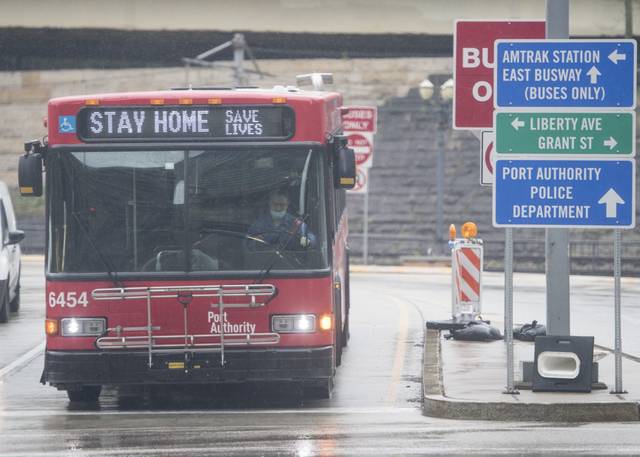Judge: Port Authority cannot ban Black Lives Matter masks
A federal judge on Tuesday ruled that the Port Authority of Allegheny County cannot ban its employees from wearing Black Lives Matters masks, finding that a policy banning political speech was “arbitrary and over broad.”
U.S. District Judge J. Nicholas Ranjan said in his 45-page opinion that Port Authority’s argument that the policy was necessary to prevent disruption among employees or with customers was unsupported by the evidence.
Instead, Ranjan wrote that it violated employees’ rights to free speech and equal protection.
While he sympathizes with the authority’s “good-faith desire to maintain a safe and productive workplace,” Ranjan wrote, “[T]he vast majority of the employee speech it has banned here — including its effective ban on ‘Black Lives Matter ’masks — would not materially undermine that goal. Moreover, any of the truly disruptive behavior that the Port Authority fears can be readily deterred and dealt with on a case-by-case basis, and likely using non-speech-based means.”
Ranjan’s decision enjoins Port Authority officials from enforcing its ban on Black Lives Matter masks.
A spokesman for the authority said he had no comment, and that the court’s opinion was being reviewed by its attorneys.
Following the death of George Floyd in Minneapolis at the hands of the police and ensuing nationwide protests, many of the Port Authority’s 1,700 drivers and other employees began to wear Black Lives Matters masks.
However, in July, after one employee complained and asked what would happen if he wore a “White Lives Matter” mask, Port Authority implemented a new policy. It stated “Buttons, stickers, jewelry and clothing (including masks or other face coverings) of a political or social protest nature are not permitted to be worn.”
Several weeks later, following additional protests of the agency, Port Authority implemented an even more restrictive policy — allowing employees to wear one of only four approved types of masks: one with the Port Authority logo; the union logo; solid blue or black; or a surgical N-95 mask.
On Sept. 30, Amalgamated Transit Union Local 85, along with several employees, filed a federal lawsuit against Port Authority, arguing that the ban on Black Lives Matter masks was a violation of their free speech and equal protection rights.
The lawsuit sought a preliminary injunction prohibiting the authority from enforcing the mask ban.
According to testimony at a hearing on the matter, Port Authority has had a policy prohibiting “political or social protest messages” since 1972.
It existed, the agency said, to avoid workplace disruption, such as disputes between employees or with the public. However, testimony showed that enforcement of the uniform policy had been “lax and largely non-existent.”
“Employees often wore political buttons and other items that seemingly violated the policy, and they were rarely, if ever, disciplined for doing so prior to the incidents involving face masks,” Ranjan wrote.
Examples provided were political buttons for Bernie Sanders; Hillary Clinton; Barack Obama and Donald Trump; in support of gay pride and sporting teams.
While Ranjan acknowledged that Port Authority officials attempted to address the initial free speech argument by banning all masks other than those already approved, he said that effort failed.
“The Port Authority may not cure a First Amendment violation by restricting even more speech,” he wrote. “Nor can the Port Authority’s generalized interest in its uniform policy justify the new policy’s broad restrictions.”
He called Port Authority’s arguments — that the restriction on speech only applies while employees are on-duty; and that there could be potential disruption because of the speech — unpersuasive.
“The Port Authority’s position reflects an outsized fear of relatively harmless, but important, employee speech — a view that is incompatible with the First Amendment, even in the unique context of a government workplace,” he wrote.
Instead, Ranjan continued, the agency could ensure harmony in the workplace by implementing other, non-speech related policies.
“In other words, nothing prevents the Port Authority from analyzing specific instances of employee speech for potential disruptiveness, rather than imposing a prior restraint on an entire category of important and highly protected speech,” he wrote. “In the end, having no policy may be better than a broad prior restraint.“
Paula Reed Ward is a TribLive reporter covering federal and Allegheny County courts. She joined the Trib in 2020 after spending nearly 17 years at the Pittsburgh Post-Gazette, where she was part of a Pulitzer Prize-winning team. She is the author of “Death by Cyanide.” She can be reached at pward@triblive.com.
Remove the ads from your TribLIVE reading experience but still support the journalists who create the content with TribLIVE Ad-Free.

